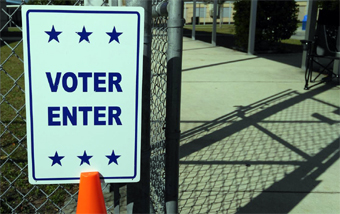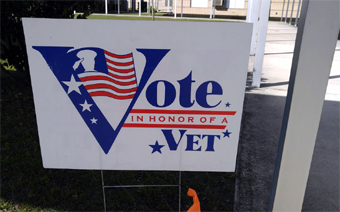
Photos by Thursday Review staff
Mega Tuesday May Spell End For Rubio and Kasich, or Herald Their Rise
| published March 15, 2016 |
By R. Alan Clanton, Thursday Review editor
Depending on how things turn out on Tuesday, the voters’ decisions from two states—Florida and Ohio—will either reshape the Republican Party by catapulting billionaire Donald Trump toward the GOP nomination, or the two valiant last ditch stands by two home state favorites will deny Trump an easy path between now and the convention in Cleveland.
Either way, it will be a tough road ahead for the Republican Party, especially that component of the GOP most commonly referred to of late as “the establishment.”
Voters in Florida and Ohio are casting their ballots today, and in the Sunshine State, Senator Marco Rubio’s political survival depends entirely on pulling off the ultimate upset—defeating Trump in a state where the real estate mogul leads in most polls by gaps ranging from as low as 7% to as high as 20%. In Ohio, where Governor John Kasich’s dark horse campaign may also make its last stand, Kasich fares better in the recent polls—effectively tied with Trump since the middle of last week, but still battling for every vote in a race too close to call.
Kasich and Rubio, the last hopes of the establishment and mainline, traditional wings of the Republican Party, may not survive past this week without victories on Tuesday. If both Rubio and Kasich fall in their own states, Trump becomes—in effect—the de facto nominee in a party in which vast and well-funded organized efforts have been mustered to deny Trump the nomination. The billionaire will move steadily closer to his goal of securing the magic number of delegates required to win the GOP nomination on the first round of balloting in Cleveland this summer.
Some political analysts and experts in the art and craft of delegate mathematics suggest a Trump win on Mega Tuesday will spell the end of at least two of his opponents, and a virtually unstoppable rise toward the leadership of the GOP. Big wins for Trump will also morph the GOP contest in a two-person marathon to the finish line, leaving Texas Senator Ted Cruz the last man standing in the now epic civil war within the Republican Party. Cruz and Trump have each been relishing just such a single combat venue, and each have implored the others to cease and desist.
But a loss by Trump in either state—and certainly a loss in both Ohio and Florida—could effectively starve Trump of new delegates, and make his path forward an uphill struggle.
A Trump loss in Ohio alone will mean the real estate tycoon must then win more than 60% of all remaining delegates in order to close the deal. Defying the polls in Florida, a Rubio win (which would be a monumental loss for Trump), would tilt the metrics even further, requiring Trump to then win some 68% of all remaining delegates. In such a scenario, it becomes increasingly likely that the Republican Party would see none of the four remaining candidates arrive to the convention with enough delegates to win outright on the first ballot, thus triggering a floor fight—aka the much-discussed brokered convention—in Cleveland.
Such an inside-the-arena battle—a nightmare for some Republican thinkers, but manna from heaven for still other strategists—would be the first for the GOP since 1964, when the insurgent conservative Senator Barry Goldwater fought a bitter, pitched war with the mainline party moderates led by New York Governor Nelson Rockefeller. That heated floor fight cost the GOP dearly, and sent the party underprepared and strategically ill-equipped for a general election fight with then-President Lyndon Johnson. Republicans lost to the Democrats that year in an unprecedented drubbing. It was a lesson Republicans learned so well the party has eschewed such knife-fight brawls ever since. The GOP came close to civil war again in 1976, when Ronald Reagan nearly deprived Gerald Ford of the nomination, but cooler heads prevailed by the time the convention was called to order, and peace has generally prevailed ever since.
A few years later Ronald Reagan would issue his famous dictum—what he called the Eleventh Commandment; thou shall not speak ill of thy fellow Republican. The rule held until the end of the millennium plus 16 years, but beginning last June that document was shredded and replaced with one which read “speak ill or thou shall not survive the oncoming tide called Trump.”
Both Florida and Ohio weigh heavily on the minds of the Republican number crunchers because of their outsize importance in the delegate count. Both the Buckeye State and the Sunshine State are winner-take-all primaries—meaning, none of the proportional math employed so far, arithmetic which has up to the point helped each of the remaining candidates retain a claim to legitimacy and relevance. A possible Rubio loss in his home state will also signal a sea change within the party: Republican voters so frustrated that they won’t even support the state’s most widely beloved conservative hero because he is associated with “the establishment” now seemingly so at odds with the angry rabble with pitch forks and torches.

Likewise, a loss by Kasich in Ohio—a state which has conferred upon the governor a rarely seen high popularity which cuts across even the normal political lines—would signal the end of the establishment’s late-arriving fight to derail Trump. Add to the mix the harsh realities that Florida and Ohio are considered pivotal in the Electoral College, and you see the reason why for GOP insiders the outcome of Tuesday’s voting is considered a reliable indicator of where the party is headed.
But it is not only the big-ticket items like Florida and Ohio where votes are being cast. Missouri, Illinois and North Carolina also vote on Tuesday—thus the moniker Mega Tuesday, a cluster of high-value states which some would argue exceed even the total value of Super Tuesday. In fact, the total number of delegates being distributed on Mega Tuesday is the largest harvest of any other primary or caucus day this year—with the exception of Super Tuesday. But it is its power to seal the deal and end candidacies which has given Mega Tuesday its power, especially to shape the GOP and its immediate future.
According to the careful analysis of the Associate Press and CNN, Trump has collected the loyalty of 460 delegates. Cruz follows in second place with about 370 delegates; Rubio and Kasich bring up the rear with about 164 and 63 apiece. A smattering of delegates also resides under the control, for now, of a few other candidates, including Jeb Bush, Carly Fiorina and Dr. Ben Carson. Carson, for example, has eight committed delegates—the most of the non-active candidates—not enough to exert any crucial sway at the moment, but perhaps a useful or even critical number if things get dicey in Cleveland, and when candidates are battling for the loyalty of every remaining, un-corralled vote.
The anti-Trumps are all receiving varying levels of assistance from the party regulars—with New Mexico Governor Susana Martinez campaigning with Rubio in Florida, Mitt Romney and Arnold Schwarzenegger gunning for Kasich at events in Ohio, and Carly Fiorina backing Cruz at various stops in Missouri and North Carolina. The conservative policy and intellectual magazine National Review, snubbed the struggling Rubio and endorsed Cruz instead—a backing made more of pragmatism for what the editors saw as the more likely winner in Cruz. National Review has waged a fierce print battle against the insurgent Trump, and recently published an entire issue devoted to why Republicans and conservatives should regard Trump as an imposter.
Trump has scoffed at both National Review’s ire and the writings of its impressive panel of thinkers and intellectuals, and at Romney himself, now a subject of ridicule from Trump and his supporters.
“Mitt Romney’s a sour guy,” Trump told NBC News after being asked to explain anti-Trump ads in which women read verbatim quotes about women by Trump from his checkered and boisterous past statements. Romney has called Trump a scam artist and a huckster, and says Republicans should have no part in inviting Trump to take the helm of the Grand Old Party.
Meanwhile, if turnout in previous contests is any indicator of what could happen on Mega Tuesday, Floridians, Ohioans and the voters in three other big ticket states will show up in droves to cast their votes—both in the GOP sweepstakes as well as in the Democratic contest, now defined by a intense battle between front-runner Hillary Clinton and challenger Bernie Sanders.
Related Thursday Review articles:
Rubio, Kasich, Cruz Question Support for Trump; Keith H. Roberts; Thursday Review; March 14, 2016.
Trump Calls for Arrests of Protesters and Hecklers; Keith H. Roberts; Thursday Review; March 13, 2016.
